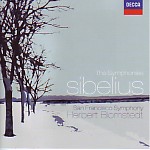Herbert Blomstedt was both lucky and unlucky on disc during his tenure in San Francisco. He was lucky in that he made no bad recordings, and wisely stuck to repertoire that he felt strongly about and conducted extremely well, such as Nielsen, Sibelius, Hindemith, Mendelssohn, Grieg, Schubert, Strauss, and Brahms. Even his rare forays into (for him) uncharted territory, such as his Mahler Second or Bartók Concerto for Orchestra, turned out surprisingly well thanks to his inherent musicality allied to fine orchestral playing. He was unlucky, though, in that his heyday corresponded to the 1990s “major label implosion”, so his work didn’t receive nearly the attention that it deserved and often didn’t enjoy long life in the catalog.
So it’s great to welcome back his outstanding Sibelius cycle, one of the finest available, right up there with Davis (Philips), Vänskä (BIS), Segerstam (Ondine), Berglund (pick one), or any other of your personal favorites. There isn’t a weak performance here. Granted, No. 2 doesn’t offer Szell’s combination of excitement and discipline, but then no one else does, and Blomstedt’s performance at least culminates in a truly powerful account of the finale. Everything else is wonderful, from the vital and energetic First, to the seamlessly managed transitions in the Seventh.
Particularly outstanding are the middle symphonies, Nos. 3-5, where Blomstedt’s control of structure and knowledge of where the music is going produce extremely impressive results. This Third, for example, certainly is one of the finest ever recorded, a performance of real inevitability and dynamism, with no hint of an anticlimax at the very end. The Fourth is aptly dark and gaunt, but it never bogs down thanks to flowing tempos and acutely observed dynamics (chimes in the finale, by the way, instead of the more usual glockenspiel).
In the Fifth, Blomstedt captures the music’s heroic demeanor with total confidence. The brass and timpani play magnificently, and the strings sustain the music’s tension through their acres of tremolo and ostinato as if they really believe in the cause. This is similar to the kind of commitment the Vienna Philharmonic routinely brings to Bruckner, and it’s rare. Blomstedt doesn’t, however, take Sibelius’ very quick tempo marking seriously in the finale of the Sixth–but then aside from Bernstein, virtually no one does. The interpretation is nevertheless persuasive, nowhere more so than in the careful balances between strings and winds that Blomstedt maintains in the opening movement, allowing the melodies to “float” atop a strong underlying musical current. Beautifully detailed sound, a deliberate and atmospheric Tapiola, and a wistful Valse triste round out this desirable package. If you missed it the first time round, don’t hesitate now. [7/19/2006]
































